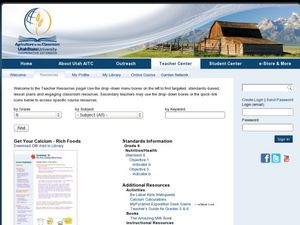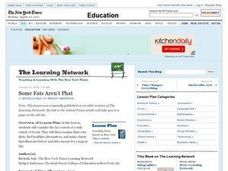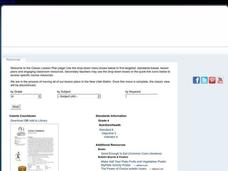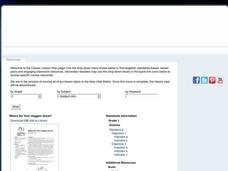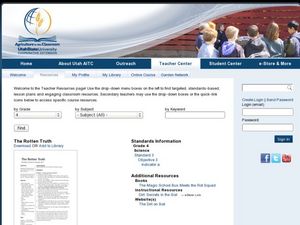Curated OER
Vary Your Veggies and Focus on Fruits
Third graders study a healthy diet. For this healthy diet lesson, 3rd graders investigate the nutritional value of fruits and vegetables. Students compare a healthy diet to their personal diet.
Curated OER
Get Your Calcium - Rich Foods
Fifth graders explore personal health by identifying positive food choices. In this calcium sources lesson plan, 5th graders discuss the common ways a human can receive calcium such as consuming dairy products. Students view a virtual...
Curated OER
Lower the Trans and Increase the Omega-3s
Students identify the health risks associated with trans fats. In this adult health lesson, students examine food labels for hydrogenated oils content. They discuss the benefits and sources of omega-3s.
Curated OER
Some Fats Aren't Phat
Students examine nutritional information on various food labels and then consider the nutritional value of the foods in their own diets. They create posters illustrating their diets "before" and "after" they considered their fat intake.
Curated OER
Favorite Foods
Students explore human health by reading agricultural books. In this dietary habit lesson, students discuss the foods we eat everyday and read two books about our human diets. Students identify the uses our body has for food and identify...
Curated OER
Hand Washing: I Can Handle It!
Fourth graders explore diseases by identifying sanitation methods. In this germ prevention lesson, 4th graders identify the common ways germs are passed and the overall impact they have on human health. Students complete several germ...
Curated OER
A State of Obesity
Students compare obesity trends between states. In this health studies lesson, students conduct research to compare and contrast obesity trends from state to state. Students view a PowerPoint presentation to determine the statistics of...
Curated OER
How Much of Each Nutrient Does Your Body Need, and How Can You Find Out What Is In Each Food?
Fifth graders practice reading food labels to find nutrients in foods. In this health lesson, 5th graders read food labels and discuss the recommended daily allowance of each nutrient. They compare this to the food pyramid and create a...
Curated OER
Grocery Store Problem Solving
Sixth graders explore the effect of healthy diets and exercise on physical and mental wellness. In this health activity, 6th graders compare food intake to the Dietary Guidelines for Americans. Students evaluate levels of activity and...
Curated OER
Calorie Countdown
Fourth graders explore human health by identifying calories in food items. In this healthy eating habits lesson, 4th graders view the USDA food pyramid on the Internet and identify the choices they should be making each day. Students...
Curated OER
Outdoor Observation
Second graders explore Earth science by participating in a nature observation activity. For this four seasons lesson, 2nd graders identify the four seasons on Earth and the weather patterns they are known for. Students read several books...
Curated OER
Trash Goes To School
Students explore solid waste background information. They are presented with a well balanced picture. Students review ideas on how to use solid waste issues in many fields including math, science, English, social studies and home...
Curated OER
What's Your Favorite Season?
Students explore earth science by creating illustrations in class. In this four seasons lesson, students identify the four different types of weather that take place during the year and read the books Harvest Year and Snow Comes to the...
Curated OER
Where Do Your Veggies Grow?
First graders investigate the origins of vegetables. In this Science lesson, 1st graders identify where fruits and vegetables come from. Students describe how people utilize plants.
Curated OER
I Think I Forgot Something!
Learners examine human health by reading a children's book in class. In this breakfast lesson, students identify the importance of starting the day with a good, nutritious meal. Learners read the book I Think I Forgot Something and...
Curated OER
Utah Weather
Fourth graders explore Earth science by researching weather patterns on the Internet. In this Utah climate lesson, 4th graders discuss why each climate on our planet is exposed to different weather settings and how they are measured....
Curated OER
Dark Days
Fourth graders investigate the impacts of erosion. In this Science lesson, 4th graders determine connections between plants and soil erosion. Students examine the historical implications of erosion.
Curated OER
Keeping Soil in Its Place
Fourth graders investigate erosion. In this Science lesson, 4th graders explore the role of weathering and plant growth related to erosion. Students define the components of soil. Students explore the history of the Dust Bowl.
Curated OER
The Rotten Truth
Fourth graders investigate compost. In this Science instructional activity, 4th graders take notes on the components of soil and its relation to plant growth. Students describe the steps in making compost.
Curated OER
The Soil Chain
Fourth graders show the needs of plants met by soil. In this Science lesson, 4th graders detail the components of soil and determine which are living or once living and non-living. Students determine the needs of plant growth that are...
Curated OER
Tree-mendous!
Fifth graders identify the ways people use trees. In this Science lesson, 5th graders play a word game with tree classification. Students determine the need for protecting natural resources.
Curated OER
Comparing Apples and Onions
Fifth graders observe heredity. In this Science lesson, 5th graders are introduced to the concept of traits being passed from parents to offspring. Students investigate the concepts through apples and onions.
Curated OER
The Food Pyramid
Students determine that humans need food to function properly. In this nutrition lesson plan, students discuss the food categories used in the food pyramid by charting the foods eaten in one day.
Curated OER
Healthy Living: How Does this Web Site Impact Medicare?
Students assess information on the Health Canada Web site and determine whether such information should be paid for with tax dollars, and whether the publication of such information has an impact on Medicare.



